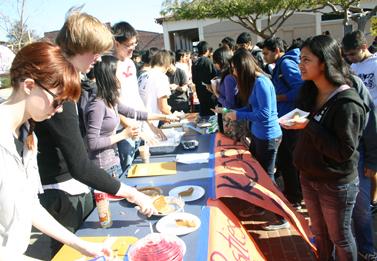 Club Commission gives a 10 minute food selection disadvantage to non-club participants
Club Commission gives a 10 minute food selection disadvantage to non-club participants

At 7:59 p.m. every semester, club presidents, class officers, and head editors get ready to submit their food choices for Club Day. They refresh their browsers again and again in an attempt to get the most popular food items such as pearl milk tea or Jamba Juice. However, this year, class officers, Yearbook, and El Estoque could not participate in the race. Instead, they had to wait an extra 10 minutes.
The Club Commission’s policy was aimed at helping smaller clubs make a bigger profit by eliminating competition. They reasoned that smaller clubs have less opportunities to fundraise compared to the classes, Yearbook and El Estoque.
“Club day is called ‘Club Day,’ so it really is a chance for [the clubs] to make money,” Club commissioner sophomore Simona Kotesova said. “Many times the class officers are typing in the form really fast and they were getting the highest-profiting foods even though the clubs were the ones that really need the money.”
However, clubs did not feel the difference in competitiveness in getting their top food choices.
“I really don’t mind [if the classes, Yearbook and El Estoque compete with us for food choices],“ Role-Playing Club president senior Denis Su said. “I didn’t notice the change when I submitted the form. I really don’t care if they implement this policy again.”
Before the forms arrived, 2012 vice president Christina Aguila practiced filling out the forms as fast as possible to get the class’ top choices. However, under the new regulations, 2012 did not get any of its top six choices and decided not to participate in Club Day.
“We are okay with not getting our first choice, but by the time we submitted our forms, all six [of our choices] were taken,” Aguila said. “So we figured it would be better to not sell anything than to lose money. I think 10 minutes is too much because most clubs, I feel, get their forms in in the first 30 seconds at [MVHS]. I think if the time was reduced, it would be fine.”
Even with the new policy, Club Commission wanted to give all clubs and organizations, including the class officers, Yearbook, and El Estoque, an equal opportunity to participate in Club Day. However, they did not predict how fast the clubs submitted their food choices.
“[The outcome] was worse than we expected,” Kotesova said. “We thought that the [penalty would] make [the classes] 20th or so, but the clubs were submitting really fast so they were 40th. We are looking into the policy and making it shorter next year.”








